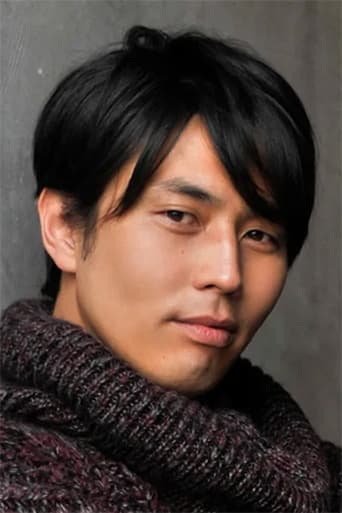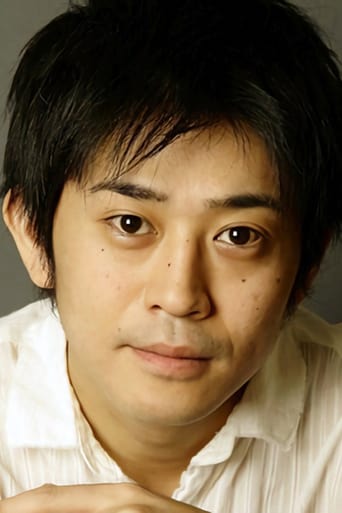SunnyHello
Nice effects though.
Bluebell Alcock
Ok... Let's be honest. It cannot be the best movie but is quite enjoyable. The movie has the potential to develop a great plot for future movies
Roxie
The thing I enjoyed most about the film is the fact that it doesn't shy away from being a super-sized-cliche;
Fleur
Actress is magnificent and exudes a hypnotic screen presence in this affecting drama.
Chris Knipp
In this gay-themed Japanese film from the early Nineties, Tatsuru (Yoshihiko Hakamada), a college student, and Shin (Masashi Endô), who's in high school, work out of the same Tokyo bar called Pinocchio as gay rent boys. Yoriko (Reiko Kataoka) and Atsumi (Sumiyo Yamada) are their respective girl friends--but not girlfriends, though they'd both like to be. Tatsuru and Shin are teen dreamboats in their way: both have boyish, androgynous good looks and perfect hair they're always fussing with. At first the focus is on the tall Tatsuru, who's shown with a john in the opening sequence, which establishes that he is sexually ambivalent and emotionally shut down. He's good at sex supposedly, if you like making love with an alabaster robot. He's cut off from his family despite his father's attempts to maintain contact and lives in a tiny apartment by himself till Shin, who knows he's gay and comes out to his parents and is kicked out of the house, moves in with Tatsuru. This is only supposed to be temporary, but it brings things to a head because little Shin's in love with Tatsuru, as he's told Atsumi. She chides Shin later for chickening out of this opportunity to declare his love to Tatsuru. This is the old theme of the gay kid who falls in love with a straight guy, except the object of his affections isn't straight but just unwilling to admit he's gay, and to make things worse is a colleague in the skin trade..Ironically, Shin is a washout as a male prostitute. Or perhaps it makes sense that somebody who knows he's gay and is in love with someone he sees all the time will have trouble turning the sex on and off mechanically the way Tatsuru can.'Slight Fever' reeks of urban ennui, though cultural differences make it a little hard for a westerner to assess the mood of this elegantly understated film--which, nonetheless, is as Hashiguchi starts out a commentary by saying, "sensational," never more so than in the scene toward the end where he himself plays a client in a hotel room who winds up with both Tatsuru and Shin in his bed, a situation that goes very badly for all concerned. This is one of a series of tense surprises. In a previous one Tatsuru goes to Yoriko's house to help move a TV and is forced to stay to dinner only to discover Yoriko's father is one of his clients. Maybe this is meant to be funny, but both males appear to be imploding throughout a meal in which the two females chatter on and on. It seems like the only communicating in the film is with or between females, but it's mostly just empty chatter. The conversations that matter between or among the males never take place.The technically so-so DVD includes a bonus section made ten years after 'Slight Fever's' release where director Ryosuke Hashiguchi describes the experience of this, his first film, and two of the main actors who've had successful careers since tell how it was for them this first time. None of the four principals had had previous acting experience. The interview films also show stills taken on the set. Hashiguchi looked a lot younger, was boyishly handsome, much like Hakamada, who was fresh from the provinces and a fashion model whose cold, blank expression the director liked; and in fact as Hakamada reports, he and the director were confused with each other on the set more than once, though Hashiguchi never acknowledged the resemblance. Hashiguchi, with typical Japanese reserve, reveals little about himself other than that he is gay and that he labored over the script for 2 1/2 years because he wanted other people to "understand how it is." The gay life--did he live it in this way? Yes and no, probably. A gay man who had a sexually promiscuous youth can easily imagine what it is like to be a rent boy. Or maybe he was one. What is clear is that the contrasts between Tatsuro and Shin dramatize the difference between a boy who knows he's gay and one who's struggling with the fact.Hashiguchi reveals that the film was a surprise hit in Japan and young men and women are seen in stills lining up for blocks to see it, while provincial gay boys wrote the director to tell him his film saved them from suicide. Hashiguchi isn't wrong when he says the film is badly made. The project was underfunded and rushed and the technical package is unimpressive. It's shot in 16mm. Visuals are okay but not great, and as the director points out things fell apart style-wise when he chose to take on the role of the john in the hotel room at the end and they switched to a hand-held camera that gets way too jiggly at one point. But if this is the seminal gay coming of age film for a generation of gay Japanese boys, those faults don't matter. There are also signs that Hashiguchi has a flair for plot and editing, despite the extreme haste in which the latter had to be done, and his later efforts (which I haven't seen) are rumored to be successful. Judging from the lack of external reviews the film seems to have had zero theatrical life in the West, so despite its local success and a sort of interesting blend of shock and understatement and the fact that the performances do work, it seems like a minor film even from the gay point of view. Some scenes are fascinating; others with a slight shift in plot elements could just be moments from some conventional Japanese TV series. But if this was a ground-breaker and now could be a conventional TV series, that's not such a bad thing either.
screaminmimi
I saw this movie in DVD release that came out 10 years after its initial theatrical release, so there is a lot of making-of stuff on the DVD that reveals some surprising things about the movie, e.g. almost all the actors were first-timers; it was a huge box office hit in Japan; the director put down his own work as substandard (much too hard on himself, in my opinion).The story itself turns and twists on the fact that characters who seem strong--Tatsuro and Yoriko--are actually weaker than their younger friends--Shin-chan and Asami-- who turn out to be strongest when they are the most vulnerable. The name of the escort service the boys work for is Pinocchio, a sort of puppet palace/donkey island where it takes something special to become a real, live boy. Overcoming self deception is the biggest hurdle. I suppose it is meant to be Tatsuro's movie, but Shin-chan stole it from him, not with any sort of mugging, but largely because of the charm of the character. All of the performances were pitch perfect.I didn't come away feeling quite as gloomy as our other commentator did, maybe because I recognize low-key Japanese upbeat-ness when I see it. I was charmed by all four of these kids, but definitely not in a manipulated Hollywood sort of way. They all seemed like the kids I teach: very real, very embattled, and very resilient.I have a quibble with the subtitles. They were mostly pretty good, but since it's an older movie, we're stuck with them... no way of turning them off. However, there was an occasional omission of some dialog from the translation that I could see no reason for, and--if left in--would have actually enhanced the understanding. I think perhaps this was critical in the last scene, and could be the thing that led the other commentator to find it depressing, because he didn't catch this one little bit of dialog--when Tatsuro tells Shin-chan how much he actually got for posing and Shin-chan's response to it--that was actually quite sardonically funny.
AJBraxton
I like art house films. And I take time to sit and watch them. I picked up this DVD hoping to get some in-site into the gay youth culture of Japan. I did find out that there seem to be some parallels with American youth. For example, each of the two main character's find's himself with a delightful "girlfriend." One is the stereotypical "fruit fly" in that she adores her gay friend (Shin) but doesn't have a man of her own. Sorta living the vicarious romance and roguishness of his life. And the other boy (Tatsuro) has a girl who is not quite sure if she is romantically interested in him and he does not reveal his true nature to her. She senses something just isn't right and stays away... that's a good thing. OH.. the movie.. worth a watch.. in a film festival student feature kind of thing. And I did not care for those lingering shots of "nothing but the actor" that the film maker included. I kept wanting to say to the characters "Do Something" but then realized that it was indeed creating some artistic tension.. intended or not.
Johan-24
Hashigushi's film about two Japanese students who make some extra money as rent boys has an atmosphere much like his later film 'Like Grains of Sand'. What is impressive about his way of filming is the intensity he creates with his slow way of filming and his long camera shots from a single perspective. This way, the focus is on the actors, and the little things they do, through which we slowly get to know them. There is one beautiful scene where one of the boys, who is in love with the other one, lies on the top of a school building, doing nothing else than looking at a photograph of his friend, which he has secretly taken from their pimp, while a girl friend just hangs around him, getting very bored with the situation. The boredom is typical of all the youths in the film, who really do not seem to have any real direction in life, no ambition, and who certainly do not seem to be able of handling there feelings. The two boys are frustratingly clumsy about showing any feeling towards each other, which doesn't offer much hope for any possibility of some happiness evolving in their dreary lives. The film does leave you slightly depressed, as there does not seem to be much reason for optimism about growing up in Japan. There is however, some relieve, due to the humour Hashigushi occasionally uses in his film, like in the scene where one of the boys visits a girlfriend, to discover that her father is one of the men who pays him for sex.



